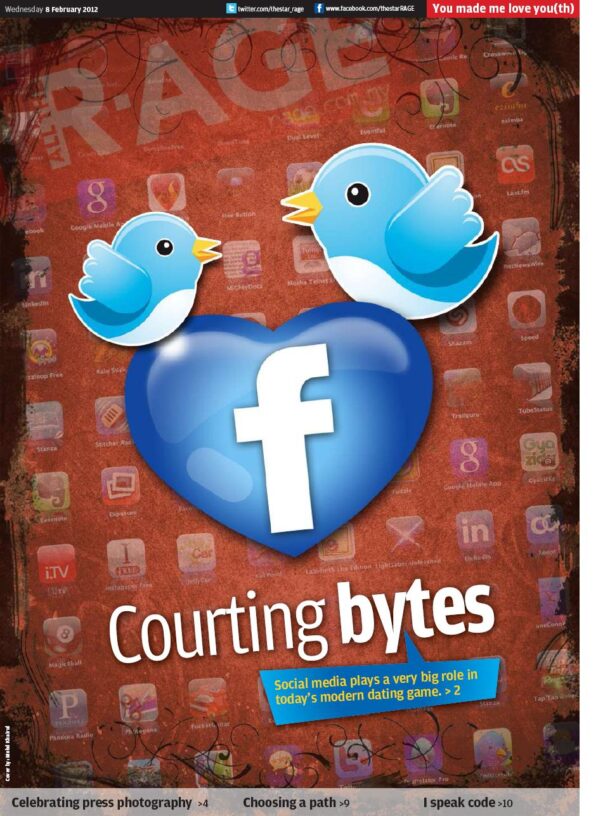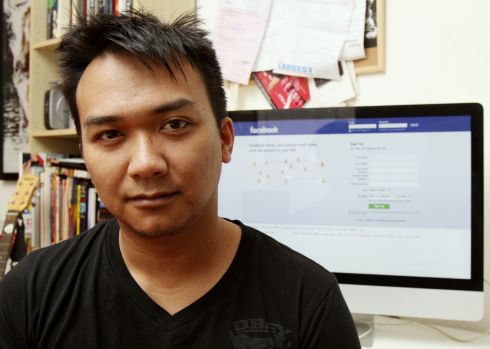By IAN YEE
alltherage@thestar.com.my
They met on Facebook thanks to a picture of a mutual friend. They started dating a month later, got engaged within three months, and a year later, they got married.
That’s the story of Lau Guan Hong, 28, and her husband – and possibly that of many other young Malaysians out there.
There is a generation of Malaysians now who would not have known of love if not for social media. Their partners would less likely be high school sweethearts, and more likely a friend of a friend of an ex-boyfriend who just happened to comment on a photo he/she tagged of a mutual friend – which is exactly how Guan Hong “met” her husband.
While working in Singapore, Guan Hong visited a friend – whom she had met through her ex-boyfriend – who had just given birth in Kuala Lumpur.
She posted pictures of the baby and mother on Facebook, which was then commented on by a mutual friend. That started a series of comments, which turned into conversations on Facebook, which then led to them meeting in person a month later.
“I was just a little nervous at first, because I was worried he wouldn’t be what he appeared to be on Facebook, but I was quite calm about it, actually,” she said.
In any case, how much different could it be from going on an “offline” date?
“I’ve dated a few guys in the past, so I knew I could take care of myself,” said Guan Hong.
She had also gone through his entire profile on Facebook – personal information, photo albums, his interactions with others on his wall, etc – so she knew exactly what she was getting herself into.
Stalking? Not really.
If screening someone’s Facebook profile, Twitter timeline or Friendster history is not something people do, then you would not have companies like the Australia-based DateScreen, who would offer to do it for you.
Actually, DateScreen only comes in when you feel like the profile of the person you have just met online is too good to be true, and you want to have him really screened by professionals before you say (or type) “I do”.
(Incidentally, DateScreen’s website says that over 120,000 marriages happen each year as a result of online dating, and that these marriages usually happen after an average courtship period of 18.5 months, much quicker than the 42-month average of those who met “offline”.)
But still, if employers are now screening potential employees’ social networks (a 2009 survey in the United States say 45% of employers do it), then doing the same for a potential life partner really doesn’t sound that crazy.
The new game
Dating is now a totally different ball game with social media involved. It’s easier, faster, and more accurate, as Guan Hong discovered.
Going through his profile, Guan Hong was able to suss out that her future husband worked in the lucrative oil and gas industry, that he strongly believed in putting family first (thanks to status updates about his family) and he rarely hung out with women or went for parties (due to the absence of your typical clubbing photos). He was exactly what she was looking for.
Of course, that doesn’t mean he could not have faked all that information on his profile, but it gave Guan Hong a good enough headstart. Now, they’re happily married and expecting their first child.
Twitter user @atreyustrange, responding to a #RAGEchat session last week on dating and social media, said she was also able to find someone with similar interests through blogging.
“We hv the same passion in indie music, and he had a blog dedicated to indie stuff. So yeah, we clicked. 😛 @AimarBA,” she tweeted.
Her partner, @AimarBA, tweeted in reply: “And its already 3 years and counting. 🙂 @atreyustrange.”
While @atreyustrange and @AimarBA happened to chance upon each other through commenting on a blogpost, Guan Hong was somewhat more proactive.
She admits rather frankly that she and a group of girlfriends were actively looking for guys on Facebook to go out with.
“There were five of us, and we would do things like post pictures of us hanging out, and comment on each other’s photos. We also changed our profile pictures a lot – because that appears on your friends’ walls!” she said, laughing in embarassment.

Kiss you through the phone? That’s SO last decade. Social media is where people get their romance on these days. – POSED BY MODEL
So did it work?
“It did! Some mutual friends would comment on our photos, and a few of us would go out with them. I was the only one who actually ended up marrying someone, though! The rest just went on dates, but they never found someone suitable so they just stayed friends,” she said.
That approach to dating might seem a little odd to some people, but like it or not, it is virtually impossible – pun intended – for young people today to have a relationship where social media does not play a role.
Not only does almost everyone have a Facebook or Twitter account now, people are also less ill-disposed towards finding a date online.
Online dating is now a multi-billion dollar industry, according to a recent report by CNBC, and a study released last year says over 42% of Malaysians have tried some form of it.
Another study commissioned by Match.com, one of the world’s first online dating sites launched in 1995, revealed last year that “online” is now the third most common way for people to meet, and that one in six new marriages is the result of an initial online meeting.
So finding love online isn’t just for desperate, romantically-challenged loners anymore. With numbers that high, it could be that young people today are simply finding online and social media to be a more effective way of getting that truly special someone.
Out in the open
The dating and relationship game has changed significantly since You’ve Got Mail (the remake was released in 1998, FYI), never mind the invention of the Internet.
While Tom Hanks and Meg Ryan were able to flirt/date/whatever-that-was (cheat?) with some degree of anonymity via e-mail, which was sort of the selling point of the film, romance in the age of social media is quite the opposite – everything is out in the open.
Young people on Twitter were up in arms over couples these days who like to conduct their relationships online – those who argue and make cryptic, overly emotional status updates, as well as couples who take their online PDA a byte too far.
@Tashairina says she’s had enough of the “soap opera” style exchanges she’s seen on Facebook between quarelling couples. Some couples also need to “Get a room, not a wall.”
She tweeted, “A relationship should be between the 2 people and not between the 2 people and everyone on facebook. #justsaying.”
Khairil M. Bahar, director of the film Relationship Status, the Malaysian and contemporary Facebook equivalent of You’ve Got Mail, says everything on social media has become so public that staying anonymous is almost impossible.
“During my generation, the Internet was about anonymity. You went online, and you were sort of hiding behind the screen. But now, social media is you, and some people still don’t get that.
“It used to be tough to stalk someone. Now, you click on their Facebook profile, you’ll know what school they go to, where they live, even which freakin’ mamak they go to,” said Khairil.
Another Twitter user, @the bosnian, said of online dating back in the day of chatrooms such as IRC (that’s Internet Relay Chat): “The days when each conversation started with ASL?”
The popular ASL (which stands for age, sex, location) conversation starter gives us an indication of how different things were before social media – it was a time when online flirting and dating was mostly anonymous, done in dodgy chatrooms and between faceless strangers for whom names are less important (a username would suffice) than the more dating-pertinent question of your age, sex and location.
What’s in a status?
Khairil says he decided to write the script for Relationship Status after realising that every one of his relationships have been somehow connected to Facebook ever since he signed up for an account.
“We either met on Facebook, flirted on Facebook, argued on Facebook or broke up because of Facebook,” he explained.
The seven storylines in the film were based on the seven relationship status choices currently available on Facebook – “Single/blank”, “Engaged”, “In a Relationship”, “Married”, “Widowed”, “Divorced” and “It’s Complicated”.
What fascinates and frustrates Khairil is how much importance people place on Facebook and relationship status.
“A lot of people who’ve seen the movie said they could relate to the stories, and one of the main things they were asking was – ‘what’s the big deal?’ Why is a relationship status important?
“My relationship status really doesn’t matter. It doesn’t define me. Unless it’s ‘Married’. But even then, you signed a (marriage) contract! Why should a relationship status mean anything after that?” he said.
Khairil says one of the main problems is that the dating “netiquette” is still vague. The unwritten rule, and the implications of your updates, who you tag in your photos, and whether or not you should be “Friends” with an ex, remain unclear.
For instance, some might equate not updating your relationship status to not wearing your wedding ring, while for others, it’s simply nobody’s business.
With that added dynamic to a relationship, things could naturally get, well, complicated.
Whatever the netiquette, Paul Jambunathan, a consultant clinical psychologist at Sunway Medical Centre in Selangor, is critical of how young people conduct their relationships on social media.
“People are making everything too public. Why must you tell the rest of the world about your relationship problems? You should only tell these things to your closest circle, your primary environment. Your secondary and tertiary environments serve different purposes,” he said.
Paul has seen a huge increase in couples coming to him with problems stemming from Facebook, but even though most of them involve spouses who use Facebook to have affairs, he says the root cause is still the same – a lack of real communication.
To put what he perceives as the problem of Facebook in perspective, Paul said: “You need to ask yourself: do you need Facebook? Is it really a necessity? Food is a need, human interaction is a need. But Facebook? That’s a want.”
The bulk of marital problems related to Facebook he deals with, however, involve people who use it to have “fantasy-fulfilling relationships”, affairs where the person pretends to be someone he or she isn’t.
“There are tonnes of people (with these problems). And I only see those who are pathological. They’ve hit rock bottom and are seeking help. They’re just the tip of the iceberg,” he said.
At the same time, Paul has also helped a broken-hearted a 19-year-old girl who was dumped on Facebook, something which @ShyaRao has experienced before, too.
The toughest part of having to change her relationship status from “In a Relationship” to “Single” was having to deal with the comments, some of which she says were “awful”.
Would she ever post her relationship status again? “I don’t think so. What’s the point of letting the whole world know my #RelationshipStatus right??”
As with any normal relationship, it’s impossible to predict if things will work out for this generation of social media daters. One thing’s for sure, though, the writing will be on the wall.



Leave a reply